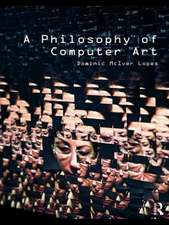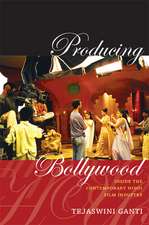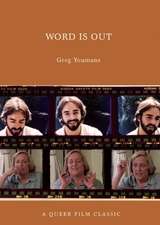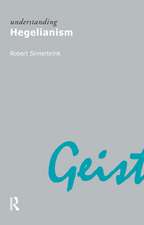Cinematic Ethics: Exploring Ethical Experience through Film
Autor Robert Sinnerbrinken Limba Engleză Paperback – 12 noi 2015
Cinematic Ethics: Exploring Ethical Experience through Film addresses these questions by examining the idea of cinema as a medium of ethical experience with the power to provoke emotional understanding and philosophical thinking.
In a clear and engaging style, Robert Sinnerbrink examines the key philosophical approaches to ethics in contemporary film theory and philosophy using detailed case studies of cinematic ethics across different genres, styles, and filmic traditions.
Written in a lucid and lively style that will engage both specialist and non-specialist readers, this book is ideal for use in the academic study of philosophy and film. Key features include annotated suggestions for further reading at the end of each chapter and a filmography of movies useful for teaching and researching cinematic ethics.
| Toate formatele și edițiile | Preț | Express |
|---|---|---|
| Paperback (1) | 412.37 lei 43-57 zile | |
| Taylor & Francis – 12 noi 2015 | 412.37 lei 43-57 zile | |
| Hardback (1) | 1110.92 lei 43-57 zile | |
| Taylor & Francis – 9 noi 2015 | 1110.92 lei 43-57 zile |
Preț: 412.37 lei
Nou
Puncte Express: 619
Preț estimativ în valută:
78.93€ • 85.77$ • 66.35£
78.93€ • 85.77$ • 66.35£
Carte tipărită la comandă
Livrare economică 21 aprilie-05 mai
Preluare comenzi: 021 569.72.76
Specificații
ISBN-13: 9781138826168
ISBN-10: 1138826162
Pagini: 230
Dimensiuni: 156 x 234 x 15 mm
Greutate: 0.36 kg
Ediția:1
Editura: Taylor & Francis
Colecția Routledge
Locul publicării:Oxford, United Kingdom
ISBN-10: 1138826162
Pagini: 230
Dimensiuni: 156 x 234 x 15 mm
Greutate: 0.36 kg
Ediția:1
Editura: Taylor & Francis
Colecția Routledge
Locul publicării:Oxford, United Kingdom
Public țintă
Postgraduate and UndergraduateCuprins
Preface I Cinema and/as Ethics 1. Cinematic Ethics: Film as a Medium of Ethical Experience II Philosophical Approaches to Cinematic Ethics 2. From Scepticism to Moral Perfectionism (Cavell) 3. From Cinematic Belief to Ethics and Politics (Deleuze) 4. Cinempathy: Phenomenology, Cognitivism, and Moving Images III Performing Cinematic Ethics 5. The Moral Melodrama (Stella Dallas, Talk to Her) 6. Melodrama, Realism, and Ethical Experience (Biutiful, The Promise) 7. Gangster Film: Cinematic Ethics in The Act of Killing Conclusion Appendix 1. Annotated Bibliography Appendix 2. Filmography Index
Recenzii
"Cinematic Ethics provides a perceptive and compelling account of cinema’s capacity to offer ethical insight. Engaging with influential thinkers such as Stanley Cavell and Gilles Deleuze and examining cognitivist and phenomenological approaches to empathy and affect, Sinnerbrink explores varied perspectives on the relationship between film and ethical life and makes an eloquent argument for cinema as a medium of ethical experience."
Jane Stadler, The University of Queensland, Australia
"Cinematic Ethics provides a wonderfully stimulating new take on this extremely popular topic. Sinnerbrink writes with outstanding clarity. He explains complex philosophical ideas in a manner accessible to all, using some of the most important contemporary works of global cinema. This superb interdisciplinary book has set the standard for many years to come."
David Martin-Jones, University of Glasgow, UK
"Within this book Sinnerbrick masterfully demonstrates the power of cinema to engage vitally with the experiential richness of ethics, and makes a strong case for cinema as a space for education, exploration, emotional engagement and cognitive understanding."
Fiona Jenkins, Australian National University, Australia
"Robert Sinnerbrink has written a wonderful book that offers an engaging examination of the themes, textures and ambiguities of films. Cinematic Ethics articulates a convincing defence of cinema as a ‘medium of ethical experience’ while additionally making illuminating interventions into long-running debates."
Richard Rushton, Lancaster University, UK
"Combining acute theoretical discussions with sensitive interpretations of individual films, Cinematic Ethics makes an important and unique contribution to the philosophy of film. A must read for anyone interested in ethics and cinema."
Thomas Wartenberg, Mount Holyoke College, USA
"Going far beyond discussions of movies as thought experiments, or as illustrations of ethical theories in action, Sinnerbrink explores the existential approaches of Cavell and Deleuze, the relations between affect and ethics, and the more complex and ambiguous ways in which ethical and social-political issues can be seen as mobilised by time-image films."
Dan Shaw, Film-Philosophy, Volume 21 Issue 2, Page 245-248.
‘It is a must-read for anyone trying to get the "lay of the land" of cinematic ethics.’
Dan Shaw, Film-Philosophy, Volume 21 Issue 2, Page 245-248
"It will be of value both to film-philosophers and theorists on the one hand, and dedicated cinephiles on the other. I recommend it to both camps, and for upper level classes on the philosophy of film."
Dan Shaw, Film-Philosophy, Volume 21 Issue 2, Page 245-248
Jane Stadler, The University of Queensland, Australia
"Cinematic Ethics provides a wonderfully stimulating new take on this extremely popular topic. Sinnerbrink writes with outstanding clarity. He explains complex philosophical ideas in a manner accessible to all, using some of the most important contemporary works of global cinema. This superb interdisciplinary book has set the standard for many years to come."
David Martin-Jones, University of Glasgow, UK
"Within this book Sinnerbrick masterfully demonstrates the power of cinema to engage vitally with the experiential richness of ethics, and makes a strong case for cinema as a space for education, exploration, emotional engagement and cognitive understanding."
Fiona Jenkins, Australian National University, Australia
"Robert Sinnerbrink has written a wonderful book that offers an engaging examination of the themes, textures and ambiguities of films. Cinematic Ethics articulates a convincing defence of cinema as a ‘medium of ethical experience’ while additionally making illuminating interventions into long-running debates."
Richard Rushton, Lancaster University, UK
"Combining acute theoretical discussions with sensitive interpretations of individual films, Cinematic Ethics makes an important and unique contribution to the philosophy of film. A must read for anyone interested in ethics and cinema."
Thomas Wartenberg, Mount Holyoke College, USA
"Going far beyond discussions of movies as thought experiments, or as illustrations of ethical theories in action, Sinnerbrink explores the existential approaches of Cavell and Deleuze, the relations between affect and ethics, and the more complex and ambiguous ways in which ethical and social-political issues can be seen as mobilised by time-image films."
Dan Shaw, Film-Philosophy, Volume 21 Issue 2, Page 245-248.
‘It is a must-read for anyone trying to get the "lay of the land" of cinematic ethics.’
Dan Shaw, Film-Philosophy, Volume 21 Issue 2, Page 245-248
"It will be of value both to film-philosophers and theorists on the one hand, and dedicated cinephiles on the other. I recommend it to both camps, and for upper level classes on the philosophy of film."
Dan Shaw, Film-Philosophy, Volume 21 Issue 2, Page 245-248
Descriere
Cinematic Ethics: Exploring Ethical Experience through Film examines the idea of cinema as a medium of ethical experience with the power to provoke emotional understanding and philosophical thinking.
In a clear and engaging style, Robert Sinnerbrink examines the key philosophical approaches to ethics in contemporary film theory and philosophy using detailed case studies of cinematic ethics across different genres, styles, and filmic traditions.
Written in a lucid and lively style that will engage both specialist and non-specialist readers, this book is ideal for use in the academic study of philosophy and film.
In a clear and engaging style, Robert Sinnerbrink examines the key philosophical approaches to ethics in contemporary film theory and philosophy using detailed case studies of cinematic ethics across different genres, styles, and filmic traditions.
Written in a lucid and lively style that will engage both specialist and non-specialist readers, this book is ideal for use in the academic study of philosophy and film.



















